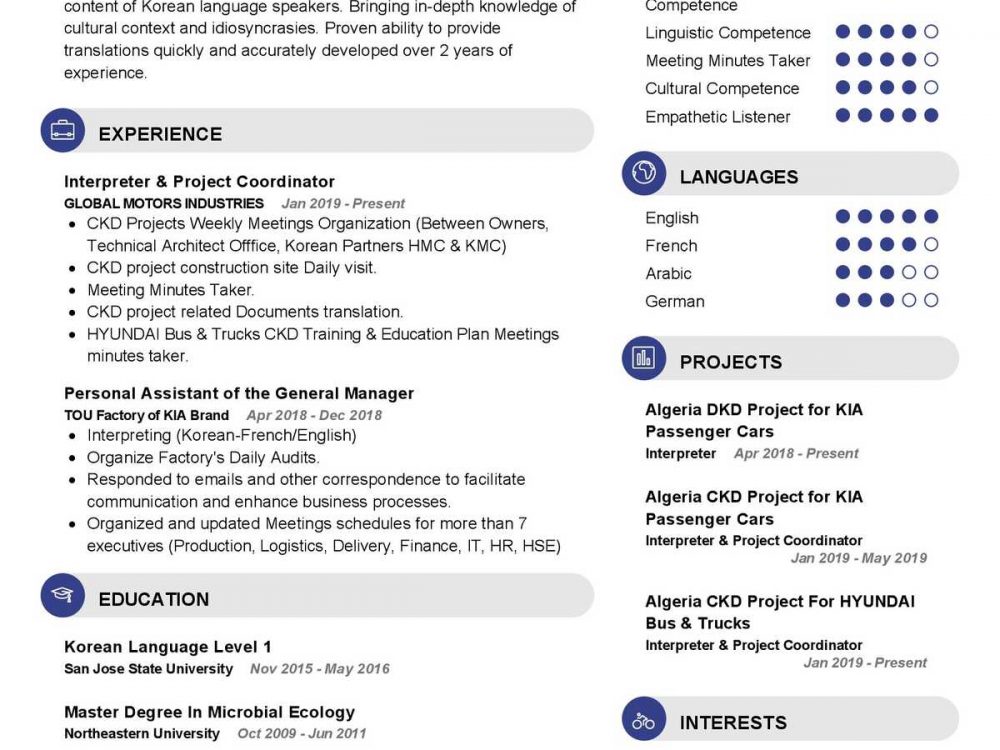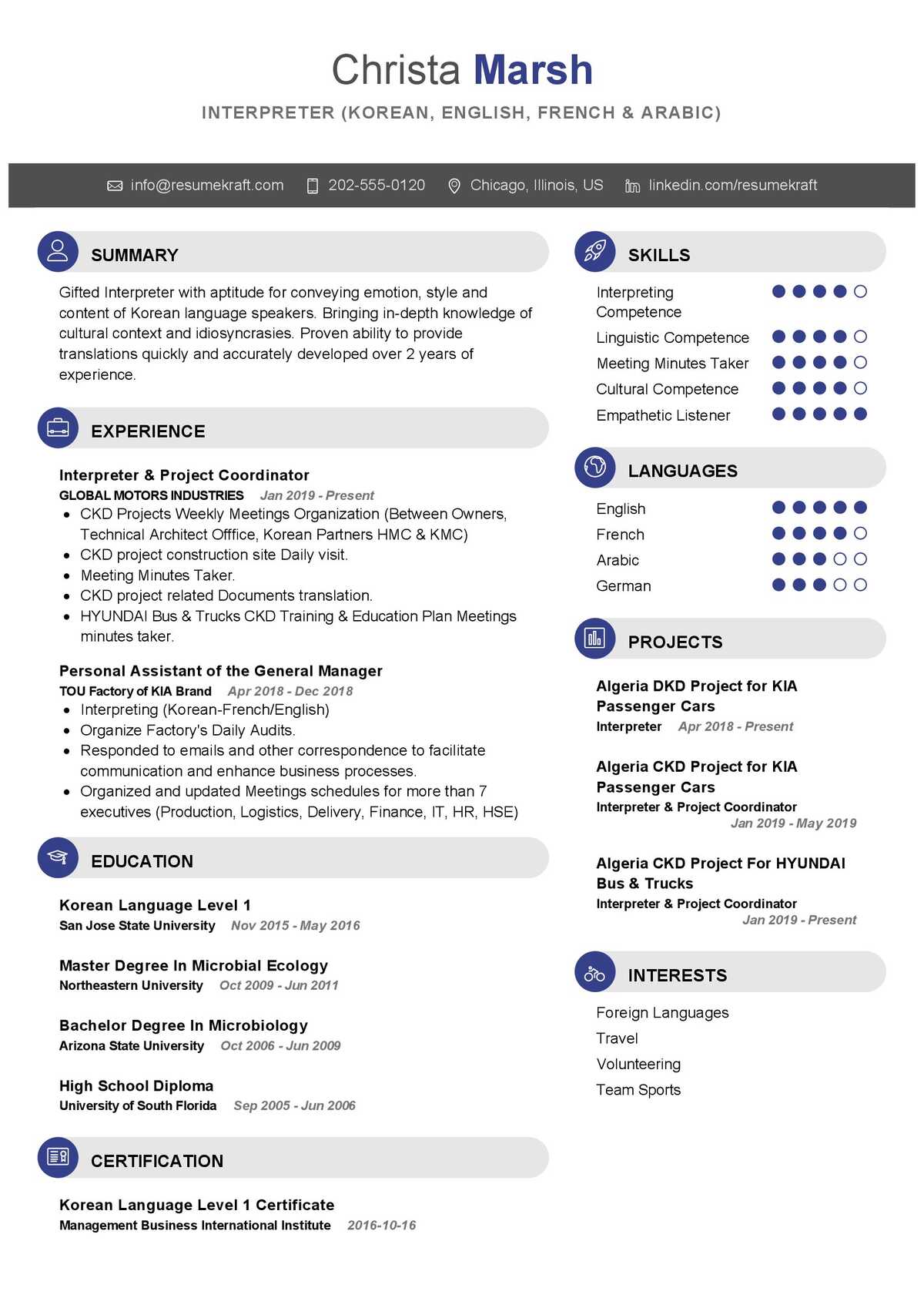Are you an Interpreter Resume by profession and looking for an exciting career? We have good news for you! use our professional Senior Interpreter Resume Resume Sample. You don’t have to start writing from scratch. Just click “Edit Resume” and modify it with your details. Update the template fonts and colors to have the best chance of landing your dream job. Find more resume samples.
Career Expert Tips:
- Always make sure you choose the perfect resume format to suit your professional experience.
- Ensure that you know how to write a resume in a way that highlights your competencies.
- Check the expert curated popular good CV and resume examples
Tips to Write a Perfect Interpreter Resume
Are you an interpreter who is looking for work in the field? Do you have experience in interpreting, translation, back-translation, and more? If you can say yes to any one of those questions or both then you should write a resume. The process of preparing your Interpreter’s Resume is not really that hard when it comes to organizing the information that will give recruiters and employers all the relevant information about what makes you an excellent candidate for their job. Your resume should contain your education details, contact information, work history as an interpreter and any other credentials that you have. A good resume will highlight your skills and experience.
The following information will help you put together a resume that introduces you to employers and gets them to take notice of your qualifications and experience. Keep in mind, it is important to include only the good stuff! Don’t overload your resume with irrelevant personal details that won’t be seen by the decision-makers. Use this guide as a guideline for writing your own Interpreter Resume.
Interpreter Key Responsibilities:
- To provide and facilitate interpretation between two languages and cultures.
- To ensure that the message is conveyed to the original form and meaning.
- To apply knowledge of two or more languages including their history, structure, syntax, semantics, culture and pragmatics.
- To be able to use language for professional discussions or negotiations among authorities related to the client’s industry.
- To have a broad knowledge of different countries, cultures and communities.
- Skilled in using information retrieval systems.
- Possess an ability to analyze and problem-solve effectively.
- To have an awareness of the local culture and preferably to be able to participate in cultural activities.
- To be familiar with the diversity of different cultures in order to adapt to other domains and contexts.
- To be able to maintain relationships with people within the client’s industry, and with their representatives, colleagues, and business partners.
Tips to Write an Interpreter Resume Summary:
- Your resume summary is the first thing employers will see when they read your resume. They are judgmental by nature, so a good summary that catches their attention will surely get you an interview. Don’t keep it too short, but don’t make it too long or complicated either. Use phrases that are unique to you and your experiences and skills.
- You want to include information like your name, address, email address and phone number at the top of your resume.
- Make sure your resume is easy to read and not too cluttered. Recruiters often only spend a few seconds looking at your resume, so make it easy for them to see the most important information first.
- Save and edit it in a word file or in PDF format on the computer you actually use to send your resumes from. This will save you time when you are proofreading and formatting.
- Avoid using a lot of bold text or font colors that can make it difficult to read.
Top 10 Effective Interpreter Skills:
- Excellent oral communication
- Good listening skills
- Knowledge of 2 or more languages
- Preferable at least a language diploma, certification, or degree.
- Fluency in English (written) and another language (spoken).
- Working knowledge of the key appropriate terminology of your area of specialization in the client’s industry.
- A professional appearance is essential for interpreting!
- Creative thinking skills in order to provide solutions to unexpected situations that may arise during sessions with clients (e.g. intercom, equipment malfunction, etc.).
- Skilled in reading body language and gestures to understand clients better.
- Working knowledge of the local culture and preferably to be able to participate in cultural activities
Top 5 Resume Writing Tips:
- Make your resume stand out from all the rest by writing it in a professional format that will impress recruiters and employers! Make sure you keep things neat and organized with clearly defined sections that highlight your skills and experience with the languages you can provide.
- Incorporate any certificates, certifications, or licenses that you might have that confirm your skills or experience.
- Include information about the languages you speak and write at the beginning of your resume along with details about any special courses or training you might have taken to help you be better at your job. This will not only highlight what makes you an excellent interpreter but it will also show employers how much effort you are willing to put into improving yourself every time that you are needed for a job opportunity.
- Be honest! You may be tempted to make your experience or skills sound better than they actually are, but this will not help you in the long run. If a potential employer catches you lying on your resume, you can’t expect them to trust anything else that you say during the interview process.
- Stand out from the crowd by adding some personality to your interpreter resume! Keep in mind that you are likely competing against many others for each job opportunity that comes up.
Tips to Write an Interpreter Cover Letter:
- Your cover letter is also very important when applying for an interpreter job. It should be 1 page long and should highlight the skills you have that make you a great candidate for the job.
- You can use it as a brief introduction to yourself and your skills, with a few key points about the job or company that you are applying to and how these skills can help their organization.
- Write it in the first person and keep it simple, leaving out any technical jargon, acronyms, etc.
- Make sure it is clear, easy to read, and well organized.
- Don’t forget to Proofread!
- Do not include information like your address or phone number in your cover letter.
- Include a resume with your cover letter.
Conclusion:
A resume must highlight the skills and experience you have that can be useful in the job that they are looking for. This should show the employer that you are a good fit for their organization. An interpreter’s cover letter is also very important in getting you noticed by employers who may have difficulty reading English.


